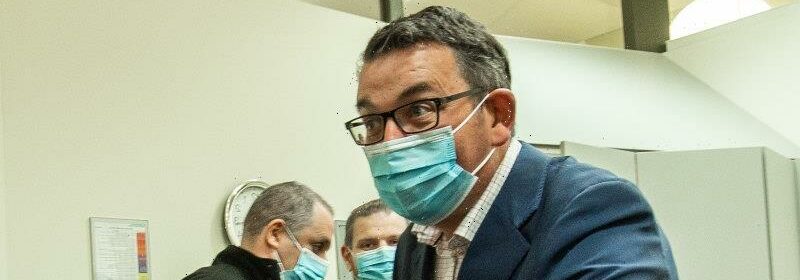Call for transparency on merits of Victorian election hospital cash splash

Greater transparency is being demanded from Victoria’s political parties on why they have targeted certain hospitals for massive election spending.
Victoria’s stressed health system has emerged as a political battleground ahead of the November 26 poll, with more than $14.5 billion collectively allocated by the opposition and government for hospitals and other health initiatives, and more promises to come.
The Coalition, led by Matthew Guy, have unveiled billions in health promises in the lead up to the Victorian election.Credit:Scott McNaughton
But the peak group for the state’s public health services say it’s unclear how the parties have been deciding which projects to promise money to and why.
There are also questions about how hundreds of new beds would be staffed and how the facilities will be built, with worker shortages across the health and building industries, on top of problems getting materials, particularly in the regions.
The Victorian Healthcare Association, which advocates on behalf of Victoria’s public health services, is calling for a more transparent process to compare the benefits of major hospital infrastructure bids, similar to Infrastructure Australia’s priority list, which lists unfunded nationally significant projects, many of them transport projects.
The association’s deputy chief executive Juan Paolo Legaspi, said the funding for healthcare infrastructure projects should not be political, but based on evidence of what would most benefit Victorians.
Hospitals have been a familiar backdrop to announcements in the lead-up to the Victorian election.Credit:Scott McNaughton
“Our public hospitals and community health services should understand how their bids for expansion or rebuilding are considered, how they compare to others, and where they are in the queue so they can make other decisions about maintaining their services to deliver healthcare,” he said.
“We currently have more transparency in the decision-making process about national roads and highways. Now more than ever, Victorians deserve a clear, apolitical process for building public health services to meet their needs.”
Victoria has a 30-year infrastructure strategy that mentions some urgent health projects, including redevelopment or rebuilds of the Royal Melbourne, The Alfred and Austin hospitals and a broad recommendation to reserve land for future hospital sites (supported in principle by the government).
One of those familiar with the Infrastructure Australia priority list is Marion Terrill, the Grattan Institute’s transport and cities program director, who said she agreed there needed to be a clear process for assessing and comparing the merit of large health projects in Victoria.
“You don’t want to be surprised by project announcements. You want to see where they have come from and have confidence that they are worth spending public money on, but also that they’re the best option to solve a particular problem.”
To date, the Coalition has promised 15 new or upgraded hospitals in a health spend worth about $12.4 billion, including a new children’s hospital in Werribee and a $400 million infectious diseases hospital.
Georgie Crozier, the Coalition’s health spokesperson, said hospital funding promises made by the opposition had come as a result of seeing troubling conditions first hand and hearing about the needs of the local communities.
She said she would be happy to have input on what projects were a priority, though she was concerned this could result in local projects in regional areas being overlooked.
Labor’s health election promises are worth about $2.5 billion and include the rebuilding – and controversial renaming – of the Maroondah Hospital and more than $1 billion to upgrade the Austin and Northern hospitals.
Both Labor and the Coalition have promised to pay for the degrees of at least 10,000 nursing and midwifery students to try and address critical staff shortages.
The initiative was first announced by Premier Daniel Andrews, then matched by the opposition.
Australian Medical Association Victorian president Roderick McRae said he was always interested in the rationale behind funding announcements, noting the first time he had heard about a new children’s hospital in Werribee was after it was announced as an election promise by the Coalition last month.
The proposal has received some support from residents.
“There’s been massive underinvestment,” McRae said. “So broadly, everything needs attention.”
Victorian Health Minister Mary-Anne Thomas said the government had spent $12 billion in health infrastructure since 2014, “but without health workers new buildings are just empty shells – so we’re investing in our workforce to deliver the care Victorians deserve”.
The Morning Edition newsletter is our guide to the day’s most important and interesting stories, analysis and insights. Sign up here.
Most Viewed in National
From our partners
Source: Read Full Article

